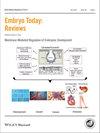Niels van Best, Mathias W. Hornef, Paul H. M. Savelkoul, John Penders
下载PDF
{"title":"物种起源:影响婴儿肠道菌群形成的因素","authors":"Niels van Best, Mathias W. Hornef, Paul H. M. Savelkoul, John Penders","doi":"10.1002/bdrc.21113","DOIUrl":null,"url":null,"abstract":"<p>The human gut microbiota is a complex and dynamic ecosystem, which naturally lives in a symbiotic relationship with the host. Perturbations of the microbial composition (dysbiosis) and reduced diversity may promote disease susceptibility and recurrence. In contrast to the mature intestinal microbiota of healthy adults, which appears relatively stable over time, the infant's microbiome only establishes and matures during the first years of life. In this respect, early childhood seems to represent a crucial age-window in disease prevention, since microbial diversification and maturation of the microbiome primarily occurs during this period of life. A better understanding of ecological processes and pioneer consortia in microbial development is crucial, in order to support the development of a beneficial microbiota. Various deterministic and stochastic aspects seem to shape the microbiome in early life, including maternal, environmental, and host factors. Here, we review the current understanding of the origin of pioneer bacteria and the evolutionary factors that influence the development of the gut microbiota in infants. In addition, future perspectives, including manipulating and promoting the succession of initial bacteria during infancy, will be highlighted. Birth Defects Research (Part C) 105:240–251, 2015. © 2015 Wiley Periodicals, Inc.</p>","PeriodicalId":55352,"journal":{"name":"Birth Defects Research Part C-Embryo Today-Reviews","volume":"105 4","pages":"240-251"},"PeriodicalIF":0.0000,"publicationDate":"2015-11-26","publicationTypes":"Journal Article","fieldsOfStudy":null,"isOpenAccess":false,"openAccessPdf":"https://sci-hub-pdf.com/10.1002/bdrc.21113","citationCount":"72","resultStr":"{\"title\":\"On the origin of species: Factors shaping the establishment of infant's gut microbiota\",\"authors\":\"Niels van Best, Mathias W. Hornef, Paul H. M. Savelkoul, John Penders\",\"doi\":\"10.1002/bdrc.21113\",\"DOIUrl\":null,\"url\":null,\"abstract\":\"<p>The human gut microbiota is a complex and dynamic ecosystem, which naturally lives in a symbiotic relationship with the host. Perturbations of the microbial composition (dysbiosis) and reduced diversity may promote disease susceptibility and recurrence. In contrast to the mature intestinal microbiota of healthy adults, which appears relatively stable over time, the infant's microbiome only establishes and matures during the first years of life. In this respect, early childhood seems to represent a crucial age-window in disease prevention, since microbial diversification and maturation of the microbiome primarily occurs during this period of life. A better understanding of ecological processes and pioneer consortia in microbial development is crucial, in order to support the development of a beneficial microbiota. Various deterministic and stochastic aspects seem to shape the microbiome in early life, including maternal, environmental, and host factors. Here, we review the current understanding of the origin of pioneer bacteria and the evolutionary factors that influence the development of the gut microbiota in infants. In addition, future perspectives, including manipulating and promoting the succession of initial bacteria during infancy, will be highlighted. Birth Defects Research (Part C) 105:240–251, 2015. © 2015 Wiley Periodicals, Inc.</p>\",\"PeriodicalId\":55352,\"journal\":{\"name\":\"Birth Defects Research Part C-Embryo Today-Reviews\",\"volume\":\"105 4\",\"pages\":\"240-251\"},\"PeriodicalIF\":0.0000,\"publicationDate\":\"2015-11-26\",\"publicationTypes\":\"Journal Article\",\"fieldsOfStudy\":null,\"isOpenAccess\":false,\"openAccessPdf\":\"https://sci-hub-pdf.com/10.1002/bdrc.21113\",\"citationCount\":\"72\",\"resultStr\":null,\"platform\":\"Semanticscholar\",\"paperid\":null,\"PeriodicalName\":\"Birth Defects Research Part C-Embryo Today-Reviews\",\"FirstCategoryId\":\"1085\",\"ListUrlMain\":\"https://onlinelibrary.wiley.com/doi/10.1002/bdrc.21113\",\"RegionNum\":0,\"RegionCategory\":null,\"ArticlePicture\":[],\"TitleCN\":null,\"AbstractTextCN\":null,\"PMCID\":null,\"EPubDate\":\"\",\"PubModel\":\"\",\"JCR\":\"Q\",\"JCRName\":\"Medicine\",\"Score\":null,\"Total\":0}","platform":"Semanticscholar","paperid":null,"PeriodicalName":"Birth Defects Research Part C-Embryo Today-Reviews","FirstCategoryId":"1085","ListUrlMain":"https://onlinelibrary.wiley.com/doi/10.1002/bdrc.21113","RegionNum":0,"RegionCategory":null,"ArticlePicture":[],"TitleCN":null,"AbstractTextCN":null,"PMCID":null,"EPubDate":"","PubModel":"","JCR":"Q","JCRName":"Medicine","Score":null,"Total":0}
引用次数: 72
引用
批量引用

 求助内容:
求助内容: 应助结果提醒方式:
应助结果提醒方式:


